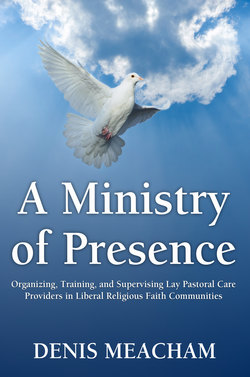Читать книгу A Ministry of Presence: Organizing, Training, and Supervising Lay Pastoral Care Providers in Liberal Religious Faith Communities - Denis Meacham - Страница 6
Chapter 1—The Basics
ОглавлениеFor many years I held a view of humanity that divided people into two categories: those who took care of others and those who did not, the latter being the more aggressive (and always male) movers and shakers who got things done and advanced the world from their leadership positions in all areas of life. I remember first having such thoughts as a boy growing up in Tucson, Arizona. When my best friend, John, and I got together to play, he’d ask, “Do you want to play war?” I’d typically say, “Sure, I’ll be the medic,” and he’d invariably come back with “I’ll be the priest,” which, even as an eight-year-old, I thought was a little strange. But what felt really good and made us buddies was that we chose to be this noncombatant team in our war game, ministering to the wounded and dying. Father John got the ones I couldn’t fix. Playing war was one of the things you did as a boy back in those days, and I always felt a little out of it being the soldier without a gun until I found a soul mate in John. Then a new house went up near us and brought Ricky into our lives. Ricky was our age but a fighter, both in life and in play. John and I were kind of excited to have a combatant in our game of war, since Ricky could supply a body for us to work on. Meanwhile, my worldview was solidifying; there were basically the tough, fighting people and the wimpier, take-care-of-others sorts, to which group I felt at the time unfortunately drawn. And this is pretty much how I saw the world as I grew up.
As I matured and became more comfortable with the gray areas of life, I began to see considerable crossover between my two groups. But I don’t think I completely gave up on my “two types of people” theory until a fellow member of Alcoholics Anonymous (AA) named Leroy changed my thinking. I was still pretty green behind the AA ears, probably a year or so into sobriety, and attended a meeting every day, several of them also attended by Leroy. One of those meetings was known for brawls that regularly broke out in the parking lot and that almost always involved Leroy somewhere near the center. Even if I had been a fighter I would have stayed clear of this man. Leroy was about four inches taller than I and at least a hundred pounds heavier. Regardless of the weather, he wore a sleeveless denim jacket with born to die emblazoned across his oxlike back. As far as I could tell, every inch of exposed skin was covered with body art, much of it the sort one acquires in penal institutions. One day I attended a new meeting for me, a huge gathering at noon on a Saturday with hundreds of people in attendance—young, old, babies in arms, dogs, and every conceivable demographic slice of humanity. There were AA and Al-Anon meetings being held simultaneously, and there was a large room given over to day care. I had my ten-year-old daughter with me, so we checked out the day care. There in the middle of the room was Leroy, his enormous body enveloping the two kiddie chairs that were keeping his fanny off the floor, surrounded by dozens of running, screaming kids. With two kids on one knee and three or four others quiet at his feet, he was reading Clifford the Big Red Dog—a sight just made to cause a paradigm shift in a beholder. That was the day the world’s fighters and wimps became one for me. We are all potential ministers to one another. In fact, I now believe that the drive to be caring is a part of everyone. Its realization in some of us can be inhibited—by neglect, by embracing hurtful values, by existential depression or despair, by drugs and alcohol—but it is there, waiting to be released.
Although I only infrequently ran into Leroy at meetings over the next few years, he was always very friendly to me. I learned from mutual friends that in his biker world Leroy less and less frequently played the role that his appearance signaled, mean and aggressive. Although advancing age and the absence of drugs and alcohol in his life had considerably diminished his lust for head bashing, he was still not someone to cross. But at AA meetings, Leroy was a teddy bear. Apparently, though we all have caregiving in our chemistry, many of us need a setting where it is safe to let that aspect out. Leroy found that space in the halls of twelve-step recovery. Others may find it in their church. Indeed, I do not believe there is a more important reason for the existence of a faith community than to be such a sanctuary in which we can open our hearts to the suffering of others.
